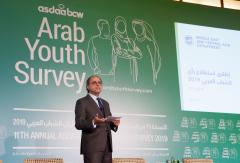IMF Economist Jihad Azour Says Arab Youth Need New Social Contract To Fulfil Their True Potential
Governments in the Middle East and North Africa must do more to provide opportunities to the region’s youth, the regional director of the International Monetary Fund, Dr Jihad Azour, said in his keynote speech at the launch of the 11th annual ASDA’A BCW Arab Youth Survey.
In his address directed to the region’s youth, Dr Azour said: “Unlike elsewhere in the world, where economic challenges have often led youth to look inward and lose trust in government, this year’s survey shows that you look to the state to facilitate solutions. You are not disengaging. You want governments that are accountable, efficient, and provide you with opportunities for prosperity.”
He went on: “You embrace technology and you have strong aspirations for better future for the region. Your concerns and demands call for a new social contract that sees the state create an environment that unleashes your potential and allows you to thrive.”
He said that the survey sheds light on growing frustrations among youth, with more than half of all respondents putting the rising costs of living as their top concern, followed by unemployment. “Reforms are underway, but they take time to bear fruit. Faster progress is needed to create the jobs for the estimated 2.8 million young people joining the workforce each year over the next decade.”
He warned youth to limit their expectations of what governments can do to solve these problems. “Nowhere in the world can governments provide everything to all. But the good news is, there is a different way.”
He said the IMF last year set out the policies that would comprise a ‘pact for a better future’ in a publication last year, called ‘Opportunity for All’.
“This pact could become the base of a new social contract and would ensure greater dialogue and accountability between governments and citizens,” he said. “The contract would see government enable the private sector to leverage trade and technology to grow and create jobs. Last, but not least, the contract envisages an e-government that leverages technology to deliver public services more broadly and cost effectively. These services include providing adequate and well-designed safety nets to the most vulnerable in hard to reach places, high-quality health services to all, and modern education systems that equip young people with the skills they need to thrive in a rapidly changing world.”
Read the full findings and expert insight and commentary, including an exclusive article by Dr Azour, on this year’s ASDA’A BCW Arab Youth Survey at www.arabyouthsurvey.com









